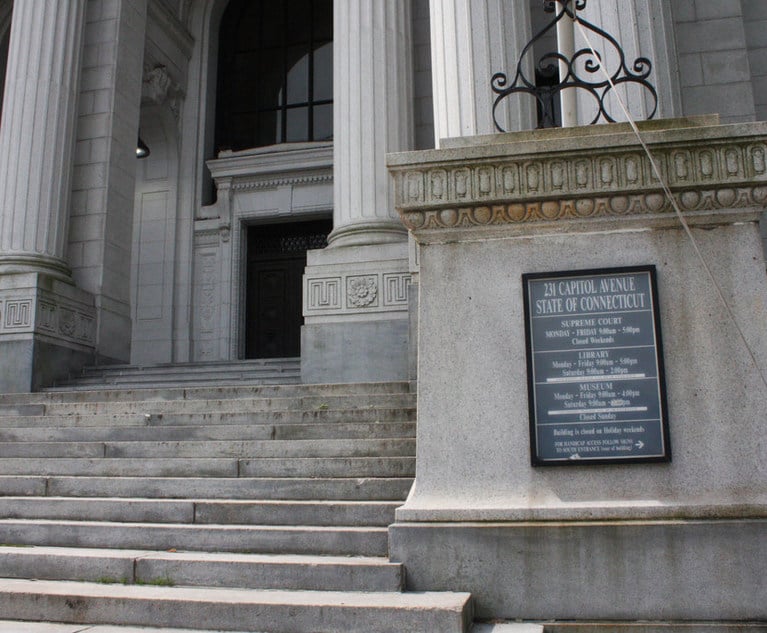 Connecticut has a way of making people pay twice for sins. Photo: Shutterstock.
Connecticut has a way of making people pay twice for sins. Photo: Shutterstock. It's Time to End Cost-of-Incarceration Liens in Connecticut
Connecticut authorized cost-of-incarceration liens against lawsuit proceeds and inheritances in 2001
February 15, 2022 at 03:30 PM
4 minute read
CommentaryFew attorneys are aware that the State of Connecticut actively enforces liens aimed at forcing incarcerated people to pay the costs associated with their incarceration—regardless of their income and as much 20 years after their release. Typically, such "cost of incarceration" liens come as a surprise to formerly incarcerated people when they come into money by, for example, receiving an inheritance or obtaining an award in a personal injury action.
Under Connecticut General Statutes § 18-85a(a), the state "shall have a claim against each inmate for the costs of such inmate's incarceration" for which the state has not been reimbursed. Although the statute provides for various exemptions, including some assets acquired after release, the state's claim extends to post-release inheritances, lawsuit proceeds, and lottery winnings, Conn. Gen. Stat. § 18-85b & 18-85c, as well as funds from federal, state, or municipal pensions, annuities, or insurance contracts, as set forth in Conn. Gen. Stat. § 52-321a(b).
This content has been archived. It is available through our partners, LexisNexis® and Bloomberg Law.
To view this content, please continue to their sites.
Not a Lexis Subscriber?
Subscribe Now
Not a Bloomberg Law Subscriber?
Subscribe Now
NOT FOR REPRINT
© 2025 ALM Global, LLC, All Rights Reserved. Request academic re-use from www.copyright.com. All other uses, submit a request to [email protected]. For more information visit Asset & Logo Licensing.
You Might Like
View All
Coerced Confessions and the Burden of Proof Beyond Reasonable Doubt


35 Years After CT's Affordable Housing Act, Progress Remains a Struggle
4 minute readTrending Stories
- 1NY No-Fault Insurance Adopts Worker’s Compensation Fee Schedule
- 2With AI Expected to Be a Focus This Year, What Changes Can Midsize Firms Expect?
- 3Dissenter Blasts 4th Circuit Majority Decision Upholding Meta's Section 230 Defense
- 4NBA Players Association Finds Its New GC in Warriors Front Office
- 5DC Circuit Keeps Docs in Judge Newman's Misconduct Proceedings Sealed
Who Got The Work
J. Brugh Lower of Gibbons has entered an appearance for industrial equipment supplier Devco Corporation in a pending trademark infringement lawsuit. The suit, accusing the defendant of selling knock-off Graco products, was filed Dec. 18 in New Jersey District Court by Rivkin Radler on behalf of Graco Inc. and Graco Minnesota. The case, assigned to U.S. District Judge Zahid N. Quraishi, is 3:24-cv-11294, Graco Inc. et al v. Devco Corporation.
Who Got The Work
Rebecca Maller-Stein and Kent A. Yalowitz of Arnold & Porter Kaye Scholer have entered their appearances for Hanaco Venture Capital and its executives, Lior Prosor and David Frankel, in a pending securities lawsuit. The action, filed on Dec. 24 in New York Southern District Court by Zell, Aron & Co. on behalf of Goldeneye Advisors, accuses the defendants of negligently and fraudulently managing the plaintiff's $1 million investment. The case, assigned to U.S. District Judge Vernon S. Broderick, is 1:24-cv-09918, Goldeneye Advisors, LLC v. Hanaco Venture Capital, Ltd. et al.
Who Got The Work
Attorneys from A&O Shearman has stepped in as defense counsel for Toronto-Dominion Bank and other defendants in a pending securities class action. The suit, filed Dec. 11 in New York Southern District Court by Bleichmar Fonti & Auld, accuses the defendants of concealing the bank's 'pervasive' deficiencies in regards to its compliance with the Bank Secrecy Act and the quality of its anti-money laundering controls. The case, assigned to U.S. District Judge Arun Subramanian, is 1:24-cv-09445, Gonzalez v. The Toronto-Dominion Bank et al.
Who Got The Work
Crown Castle International, a Pennsylvania company providing shared communications infrastructure, has turned to Luke D. Wolf of Gordon Rees Scully Mansukhani to fend off a pending breach-of-contract lawsuit. The court action, filed Nov. 25 in Michigan Eastern District Court by Hooper Hathaway PC on behalf of The Town Residences LLC, accuses Crown Castle of failing to transfer approximately $30,000 in utility payments from T-Mobile in breach of a roof-top lease and assignment agreement. The case, assigned to U.S. District Judge Susan K. Declercq, is 2:24-cv-13131, The Town Residences LLC v. T-Mobile US, Inc. et al.
Who Got The Work
Wilfred P. Coronato and Daniel M. Schwartz of McCarter & English have stepped in as defense counsel to Electrolux Home Products Inc. in a pending product liability lawsuit. The court action, filed Nov. 26 in New York Eastern District Court by Poulos Lopiccolo PC and Nagel Rice LLP on behalf of David Stern, alleges that the defendant's refrigerators’ drawers and shelving repeatedly break and fall apart within months after purchase. The case, assigned to U.S. District Judge Joan M. Azrack, is 2:24-cv-08204, Stern v. Electrolux Home Products, Inc.
Featured Firms
Law Offices of Gary Martin Hays & Associates, P.C.
(470) 294-1674
Law Offices of Mark E. Salomone
(857) 444-6468
Smith & Hassler
(713) 739-1250











